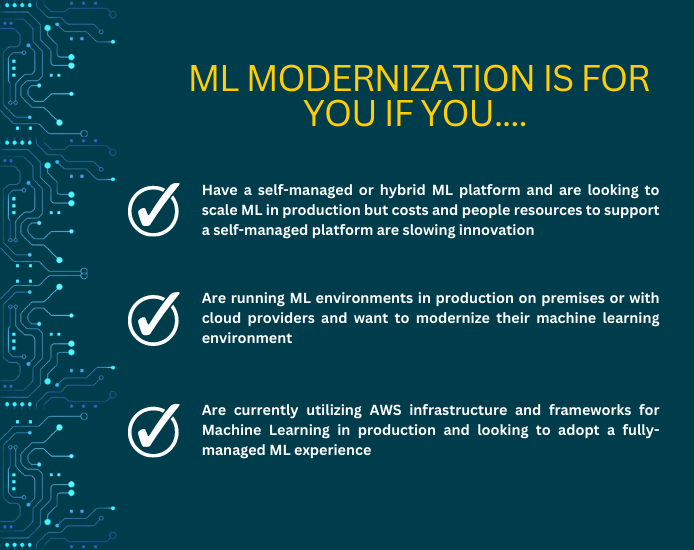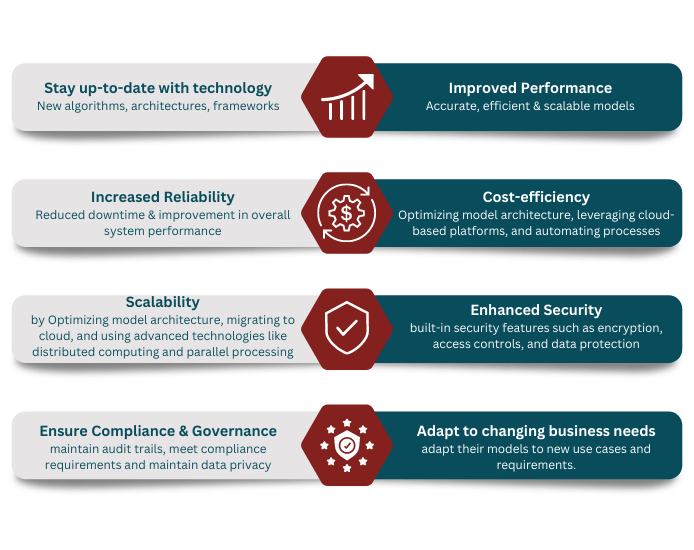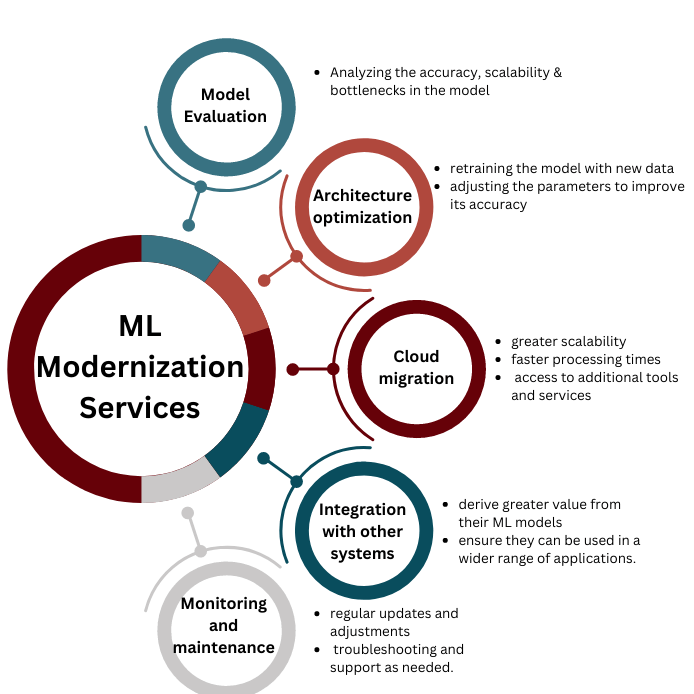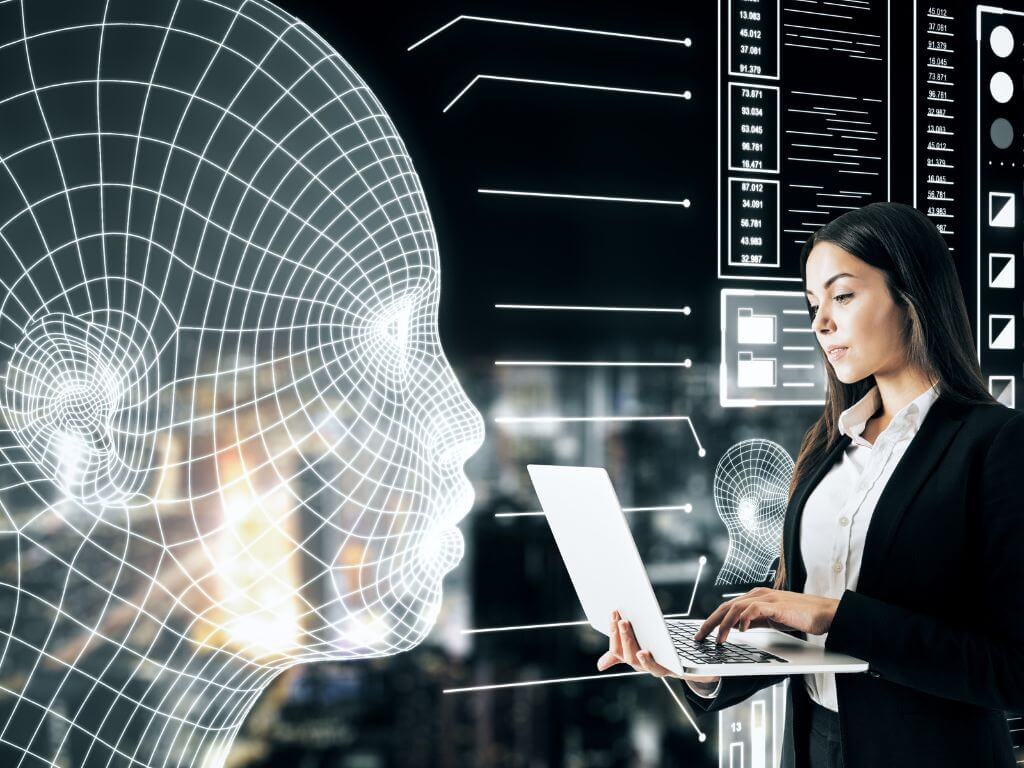What is ML Modernization
ML modernization refers to the process of updating or improving the capabilities and efficiency of machine learning (ML) models and systems. As technology and business needs evolve, ML models that were once cutting-edge can become outdated, and require modernization to continue providing value.
Modernization can involve a range of activities, from updating the algorithms and architecture of an ML model, to adopting new tools and frameworks that improve its performance and reliability. This may also include migrating ML models to cloud-based platforms or re-architecting them to take advantage of distributed computing resources.
The goals of ML modernization typically include improving model accuracy and reducing latency, while also improving scalability, reliability, and cost-efficiency. ML modernization is essential for organizations looking to stay competitive and to derive the maximum value from their data. By keeping their ML models up-to-date, organizations can remain agile and responsive to changing business needs, while also improving the accuracy, scalability, and cost-efficiency of their ML systems.

Challenges being faced by Businesses using outdated models
- Reduced accuracy: As data changes and evolves, models may not be able to keep up, resulting in reduced accuracy in the predictions or insights provided. This can lead to incorrect decisions and a loss of trust in the model's results.
- Increased latency: Models may not be optimized for current hardware or software, resulting in slow processing times and increased latency. This can impact the ability of the business to make decisions in real-time or to process large amounts of data efficiently.
- Lack of scalability: Models may not be designed to scale with the growth of the business, resulting in limited capacity and the need for manual intervention to manage the model. This can lead to inefficiencies and added costs.
- Security vulnerabilities: Models may be more vulnerable to security breaches, as newer security protocols and techniques may not be implemented in older models. This can lead to data breaches or other security incidents that can be costly and damaging to the business.
- Inability to adapt to new use cases: As the business evolves and new use cases arise, models may not be able to adapt to new requirements or data sources. This can limit the usefulness of the model and hinder the business's ability to innovate and stay competitive.
Why do organizations need ML Modernization
Outdated ML models can be a major barrier to a business' success and need to be periodically updated to ensure they remain relevant and effective in meeting business needs. Modernizing the ML models will offer the following benefits to organizations:

- Improved performance: As models become outdated, their performance degrades over time. ML modernization ensures that models remain accurate, efficient, and scalable, enabling organizations to derive more accurate and relevant insights from their data.
- Adapt to changing business needs: ML models are built to serve specific business needs, but as those needs change, models must also evolve. Modernization allows organizations to adapt their models to new use cases and requirements.
- Stay up to date with technology: The field of ML is rapidly evolving, with new techniques and tools emerging all the time. Modernization allows organizations to take advantage of the latest advances in the field, including new algorithms, architectures, and frameworks.
- Increased reliability: Older ML models may be prone to errors or fail to scale properly, leading to downtime and lost productivity. Modernization can improve the reliability of models, reducing downtime and improving overall system performance.
- Cost-efficiency: Outdated ML models may require expensive hardware and software to maintain, leading to high operating costs. Modernizing ML models can help reduce costs by optimizing model architecture, leveraging cloud-based platforms, and automating processes where possible. This can help businesses reduce the costs of maintaining and operating ML models, while still achieving accurate predictions and insights.
- Improved accuracy: Outdated ML models may not be able to keep up with changing data patterns and evolving business needs, leading to reduced accuracy in predictions and insights. Modernizing ML models can help address this issue by incorporating new data sources and updating algorithms, resulting in more accurate predictions and insights.
- Scalability: As businesses grow and data volumes increase, ML models may not be able to scale to meet demand. Modernizing ML models can help address this issue by optimizing model architecture, migrating to cloud-based platforms, and incorporating advanced technologies like distributed computing and parallel processing. This can enable models to process larger volumes of data more quickly and efficiently, without sacrificing accuracy or performance.
- Enhanced Security: By modernizing their ML infrastructure, companies benefit from built-in security features such as encryption, access controls, and data protection. With a fully managed infrastructure, they can reduce the risk of security breaches and focus on building and deploying their ML models.
- Ensure Compliance & Governance: The get a secure and scalable environment that enables them to maintain audit trails, meet compliance requirements and maintain data privacy.
- Reduce Latency: With low-latency capabilities, companies can deliver real-time insights and enable faster decision-making.
- High Level of Automation: ML Modernization provides end-to-end workflows for data preparation, model training, and deployment, enabling a high level of automation. With automated workflows, companies can save time and resources and increase the speed of model deployment.
- Facilitates Collaboration Between ML Practitioners & Non-Experts: With no-code and low-code options, ML Modernization facilitates collaboration between ML practitioners and non-experts, enabling cross-functional teams to work together more effectively. By enabling non-experts to build and deploy ML models, companies can leverage the expertise of their entire workforce and increase innovation, collaboration and knowledge sharing.
What are ML Modernization Services
Our ML modernization services help businesses update and optimize their existing machine learning (ML) models. These services are designed to help organizations keep their models up-to-date and ensure they continue to deliver valuable insights and predictions.

Organizations looking to modernize their ML models should start by evaluating their existing models to identify areas for improvement, define their goals, and choose the right modernization approach. Partnering with an experienced technology company or consulting firm can help organizations navigate the modernization process with ease. Developing a modernization roadmap can also help organizations stay on track and identify potential roadblocks or challenges.
At the heart of our ML Modernization services is our commitment to delivering real value to our customers. We believe that ML has the power to transform businesses, and we are passionate about helping our customers unlock that potential. Contact us today to learn more about how our ML Modernization services can help you achieve your business goals.



